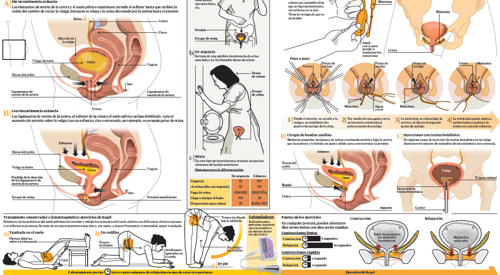Urinary Incontinence Surgery
"Women and men often suffer and hide this problem out of embarrassment, to the point that an estimated 70% of those affected by incontinence do not consult a doctor".
DR. JOSÉ ÁNGEL MÍNGUEZ CODIRECTOR. GYNAECOLOGY AND OBSTETRICS DEPARTMENT

What is urinary incontinence surgery?
Urinary incontinence is the involuntary loss of urine without control of the filling and emptying of the urinary bladder, sometimes accompanied by a strong desire to urinate.
It is caused by age, pregnancy and childbirth, menopause, functional and cognitive deterioration and other factors, such as surgery, obesity, certain types of physical exercise, etc.
Because of their involvement with modesty and social embarrassment, consultation of these problems is often delayed or, on occasions, avoided. For this reason, the real incidence is unknown, although it is estimated that around two million people in Spain suffer from it. Of these, only 10% go to the doctor.
The paradox is that involuntary incontinence, which affects the quality of life of those who suffer from it so much, can be significantly improved and even completely overcome.

When is surgery for urinary incontinence indicated?
Surgery is reserved for patients for whom conservative treatments have failed.
There are around 200 different surgical procedures.
The most common treatments for this problem that we perform at the Clínica Universidad de Navarra are band surgery, mini-tape surgery and botulinum toxin.
Would you like to know more about this treatment?
If you would like more information, please do not hesitate to contact our team.
Types of surgeries for urinary incontinence
Band surgery
Due to its effectiveness, in 90% of the cases the intervention consists of placing synthetic mesh underneath the urethra, which is inserted through a small vaginal incision.
The operation lasts about 25 minutes and is usually performed under epidural anesthesia, and can even be performed under local anesthesia.
It is a tape, usually made of polypropylene, a material very well tolerated by the body, which is placed under the urethra without tension. As it is porous, it remains fixed and ends up integrating into the body.
It is a simple and very non-invasive procedure, which facilitates the rapid recovery of the patient at home. Incontinence ceases as soon as the mesh is placed, although it is recommended to avoid great efforts during the first month after the operation.
Mini-sling surgery
Through a single incision under the urethra, a small tape is placed that is fixed internally, without holes in the skin.
It has greater advantages than the synthetic mesh technique, greater comfort for the patient and the advantage that it is adjustable.
Botulinum toxin
In some cases, injection of botulinum toxin into the bladder decreases the number of episodes of urge incontinence.
The Department of Urology
of the Clínica Universidad de Navarra
The Department of Urology of the University of Navarra Clinic offers the patient a medical team, composed of first-rate professionals, and state-of-the-art diagnostic and therapeutic means such as the Da Vinci® robotic surgery.
The Department of Urology possesses the certificate of accreditation of the European Board of Urology, a reinforcement of the excellence of the service at the level of care, teaching and research, which in Spain only three hospital centers possess.
Diseases we treat:
- Prostate Cancer
- Kidney Cancer
- Bladder Cancer
- Testicular Cancer
- Benign prostatic hyperplasia
- Urinary Incontinence
- Renal Lithiasis
- Genitourinary Prolapses
- Pediatric Urology

Why at the Clinica?
- A team of top-level professionals trained in international centers.
- State-of-the-art technology for diagnosis and treatment.
- In 24-48 hours you can start the most appropriate treatment.
















